meaning of the word Mecca in Bible part 2
| @kufrcleaner |
To all the evaders and those who want to distance Mecca from the Holy Book... Mecca returns to you, explained by the leader of interpreters, Rabbi Youssef Al-Fayoumi ... Rabbi Youssef translated the Torah... for Arabic-speaking Jews, and he preserved the pronunciation of the names of Arab places and cities with their Arabic pronunciation... and from here came the scandal... I will leave you with the interpretation, but whoever wants to translate the text better than me, let him do so... for I am not an expert in German... and I do not think he will deviate from this meaning and context. Every Christian should think about his situation because there is no doubt that this man is one of the best translators and interpreters of the Torah... and this is according to the testimony of Jews and Christians and not according to the words of any Muslim at all... Youssef Al-Fayoumi says that the name actually refers specifically to a geographical area famous among the Arabs, which leaves no room for doubt that he is talking about Mecca ... and what city among the Arabs is more famous and holy than it? And whoever wants to enter from the Christians and would like to add to me the name of a country famous among the Arabs according to the text and bears the same name as Mecca, let him come forward, thank you...
The evidence continues that the sons of Ishmael were the ones who built Mecca, which the text refers to with the word Bakh, which is also a reference to Mecca, but they did not consider them as a name from its origin, so it remained hidden for a longer period of time...
The name of the book is the Samaritan Book of Legends Asatir, which may mean the hidden and concealed, and this book among the Jews of Samaritans is completely parallel to the book of the Midrash or the Jewish Talmud among the Hebrew Jews in its importance and in its relation to Moses.
The Samaritan tradition received by them is the belief that its author is Moses himself or that it was received from Moses by someone else. The Samaritans in general believe that it is the book of Moses... and they attribute it to "our master Moses."[33] Although it did not have the sanctity and importance of the five books of Moses (the Torah), every fact mentioned in it, no matter how small, is correct and reliable for them. [34] Dr. Moses Juster, the translator and editor of this book, believes that the book dates back in its history to the middle of the third century BC. He confirms that the manuscripts of this book are the oldest manuscripts ever found among all the Jewish and Hebrew books after the Torah.
( 1) And it happened that after the death of our master Abraham, peace be upon him, that Ishmael ruled as a king for twenty-seven years.
(2) And all the sons of Ishmael, who were descendants of his firstborn son Nebaioth, ruled for one year in Ishmael's life.
(3) And for thirty years after his death (they ruled) from the river of Egypt to the great river, the Euphrates River, and they built Bakkah.
(4) And so it was said in Genesis (25/18) "When you come toward Assyria, he dwelt before all his brothers."
And now we want our Christian friends who roam around mocking us inside the forum regarding Bakkah or Mecca, thinking that we claim it falsely, to tell them with full confidence, not after all this evidence .... Keep silent now, for the book that you change and alter has spoken what it hides, God has spoken it and the holy city that you do not recognize has appeared despite you... And the research will continue to demolish the foundation of your pagan belief. The cooking continues.
The Arabic Translation of the Psalms and Commentary on Them by Rabbi Saeed Al-Fayoumi "
from Psalm 73 to Psalm 89.
.....
http://archive.org/details/saadiaalfajjmis00gallgoog
. The words are indeed present on page 44 in the upper half, point 12.
The Christian brothers began from the beginning of the talk about Saeed the Jew Fayoumi in responding to the imaginary doubt, and when they failed, they began to say that the existence of the names Mecca and Medina is not a pretext for Muhammad, may God bless him and grant him peace, to be a prophet.... because your priests and Jewish rabbis will not leave the name of the prophet who condemns them written like this, as they strongly denied the emergence of a prophet from the lineage of Ishmael, and they were residents of Mecca and saw the idols placed around the Kaaba, the House of God, and they were happy with their efforts.... and they are people of the Book.... so why did no one appear among them to say that the Kaaba was not built by the Prophet of God Abraham or his son Ishmael, peace be upon them... everyone knows the truth, but they want to extinguish the light of God with their mouths, but no way.... and I would like to address the Christian brother who refuted this doubt.... What is the interest of Saeed Fayoumi in registering the name Mecca, and he is the one who does not recognize the prophethood of our master Muhammad? What is the benefit of including the Arabic names of the regions that are in the Holy Book, and whose location is not known by your greatest and most important priests now... Perhaps you will respond to us here and we will not enter with you In a sterile debate about your religion and your sanctities, but take this injection as well,
Saeed clearly refers to Mecca and Medina in the Book of Genesis, which was written in the tenth chapter, verse number 30....
"And their dwelling was from Mesha, as you come toward Sephar, the mountain of the east..."
Saeed Al-Fayoumi translated it as follows: "And their dwelling was from Mecca as far as you come to Medina, to the eastern mountain..." referring to the sons of Joktan or Qahtan, if that is correct...
| This image is in another size. Click here to view the image in its correct form. The image dimensions are 660x122. |
.................................................. ..
| This image is in another size. Click here to view the image in its correct form. The image dimensions are 1366x768. |
We also take from the Bible dictionary here under the title of Misha the following...:
Translation:
"There was no objection among the later Jews to transferring both Misha and Safar to Mecca and Medina."
I said, "Nice. "
I will return to write about Saeed al-Ja'un, or Saeed al-Fayoumi, the head of all, as they call him, and the founder of Hebrew grammar. He was the first to translate the Torah for the Arab Jews and established what is called the Arab-Jewish culture.... So that the wise Christian, not the one who wears the Internet and memorizes without understanding, can be sure of Saeed's position. I will also use references and books written by Christians and Jews so that there will be no argument... God is the Grantor of success.
Here I will convey to you the opinions of one of the translators of the Holy Book that you hold in your hands. Prepare to hear what he said ... and this was in the year 1780 AD. 
First, this is a translation of the Holy Book and the beautiful thing is that the translator wrote us a beautiful introduction. I will not say what he said in it so that the respectable Christian does not feel that I am attacking his book, but I will let him read from the text of the book itself. 
I will present to you the cover of the book from which I quoted and it is written in Latin and I believe that its translation is the Holy Book, the five books in Arabic and Latin .... The book is available on the Internet for free ... The book dates back to the year 1780 AD ... I do not know exactly the name of the author and I do not think that anyone would begin to translate a holy book without having sufficient knowledge and he provides us with the translation in Arabic accompanied by the language Latin with it for comparison and follow-up... a beautiful thing...
| This image is in another size. Click here to view the image in its correct form. The image dimensions are 856x724. |
and this unique translator who clearly criticized the poor Arabic translation in his time and that those who translated it did not translate it well ... as he says and not me as you will see... so I photographed for you the first five pages or more or less of the book so that you can see what it testifies to for your holy book... but what concerns me here... is what he says about Rabbi Saeed Al-Fayoumi... so that these fools are silenced forever...
notice the first page begins with In the name of God, the Most Gracious, the Most Merciful... and this of course does not happen in our time even though the phrase has nothing to do with the Trinity or monotheism on this entire page it is number one (1) and the one that follows it is two... and at the bottom of the page it is number four and five and this is not the order of the book but the order of what I have quoted from it... and to every doubter of the validity of my words, come forward with pride and prove the opposite of what I have presented here of evidence of the Rabbi's mastery of the Hebrew language and the Arabic tongue together... and he will have thanks and gratitude.
| As for the Hebrew word in the text, it is בָּכָ א , and it does not mean crying, because crying in Hebrew is בכ ה , and the difference between the two words is clear. |
Perhaps what may be in the text is “wept” in this form with the letter alif ending with “a”, but the real text, God knows best, ends with the letter ha’ with “ha”, so we see the Septuagint translate it as “crying”, and a reaction to that we see the religious biblical dictionaries translate “wept” with “baka’a” as “weeping”, but this is wrong, and perhaps the letter ha’ was replaced with an alif by mistake. The famous interpreter Adam Clarke mentions that there are 7 manuscripts in which it appears like this “baka” “bakaha” (1), so we see in Saeed Al-Fayoumi’s interpretation the second form “Bakkah”.
| This image is in another size. Click here to view the image in its correct form. The image dimensions are 1922x1439. |
| According to the evidence that will be conveyed to you, “Bakkah” originally existed in the city of “Jerusalem” and not in Mecca, and in accordance with the text of the verse in Surat Al Imran that the first house was built in Bakkah - then the first house built is the one in Jerusalem, which is the Temple of Solomon or the Al Aqsa Mosque today, and not the Sacred Mosque in Mecca. |
, by reviewing the hadiths and sayings of the companions (may Allah be pleased with them) and the commentators, the conclusions are that the first house is Mecca, and between it and Jerusalem is 40 years. Secondly, Bakkah is one of the names of Mecca, but there is a difference in the meaning of the name. Does it include the entire sanctuary, or all of Mecca, or...etc. And the Station of Abraham in Mecca, as is known to us...
what is meant by Bakkah is Mecca.
containing the Old and New Testaments: the text is carefully printed from the most correct copies of the present authorized translation, including the marginal readings and parallel texts (1817)
page 267
By the way, I recall the words of Rabbi "Ron Shaya" in which he said "The names in the Old Testament cannot have been mentioned arbitrarily and by chance" ..!
We will try to stop a little at the meaning of Bakkah mentioned in the text of Psalm 84:6
Bakkah = the tree of balm, the tree of weeping.
The Valley of Bakkah = the valley of the tree of weeping
| This image is in another size. Click here to view the image in its correct form. The image dimensions are 768x559. |
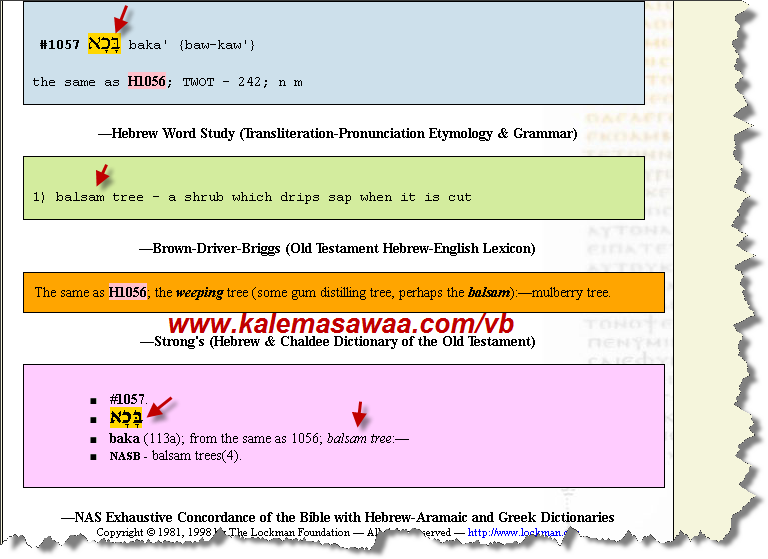
Some Christian websites often explain the meaning of Bakkah (the weeping tree) and link it to Mecca , thus violating the words of our esteemed guest above.
| This image is in another size. Click here to view the image in its correct form. The image dimensions are 805x342. |
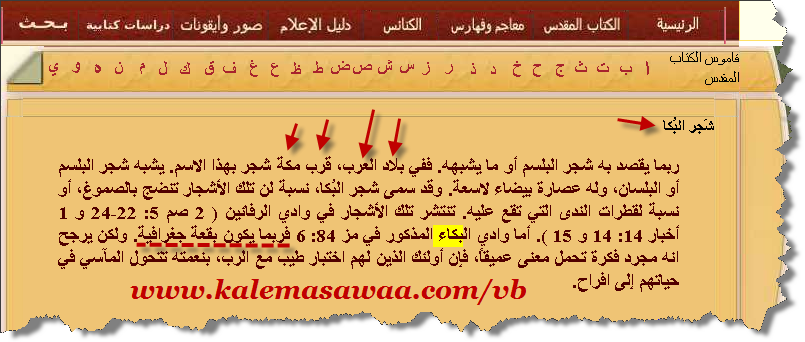
| This image is in another size. Click here to view the image in its correct form. The image dimensions are 1009x598. |
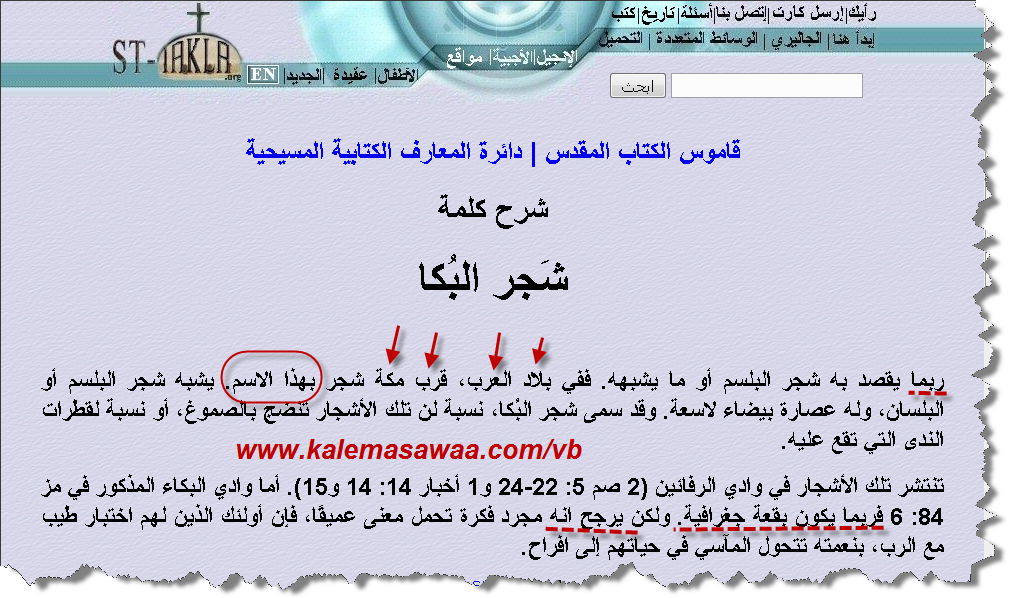
As the honorable follower can see, all the dictionaries of the Holy Bible try to cover up the truth of (Bakkah) through words that are mostly filled with doubt and suspicion....!
We note by the way that the Ismailis were famous for trading in the balsam tree mentioned above:
| This image is in another size. Click here to view the image in its correct form. The image dimensions are 991x606. |
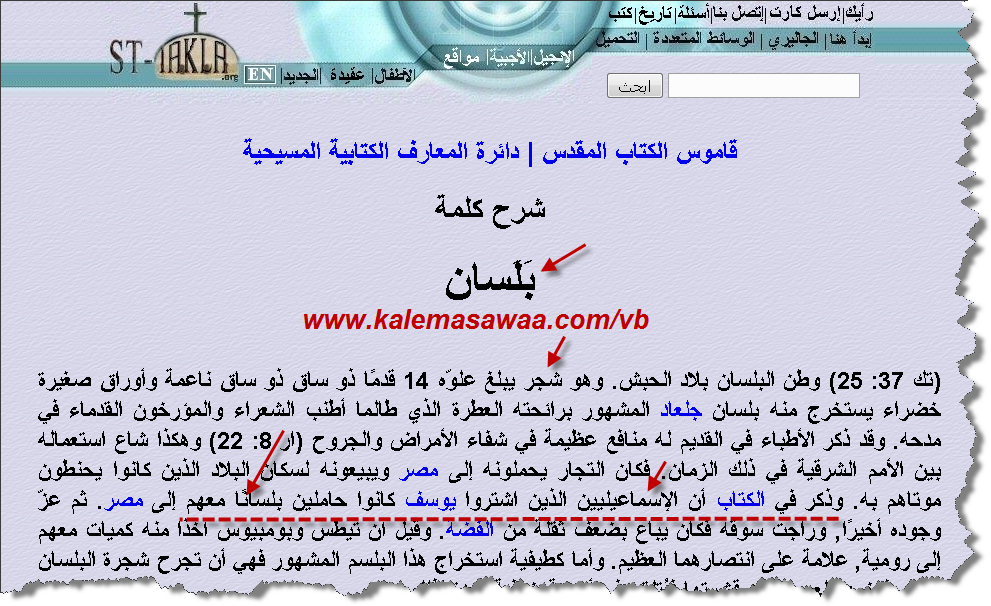
Who are the Ishmaelites???
The answer is from the Takla website.
The Ishmaelites | The Ishmaelites
are the descendants of Ishmael, son of Abraham, from his Egyptian slave Hagar. It was mentioned in Genesis 17:20 and 25:12-16 that Ishmael had twelve sons who became princes and heads of tribes. These tribes inhabited the northern part of the Arabian Peninsula on the borders of Palestine and Mesopotamia (Genesis 25:18). The Ishmaelites were known as the most important nomadic traders who moved from one place to another (Genesis 37:25-28). They were also known for their skill in driving camels (1 Chronicles 27:30), living in tents (Psalm 83:6), and being skilled in using the bow (Isaiah 21:17).
Sometimes the name “Ishmaelites” is used To indicate the nomadic tribes that inhabited the north of the Arabian Peninsula, and therefore the Midianites are called Ishmaelites (Gen. 37:25-28). The majority of these tribes were nomads, but some of them settled and established independent kingdoms such as the Nabataeans, the Palmyrenes (residents of Palmyra or Palmyra), the Ghassanids or (Banu Ghassan), and the Lakhmids or (Banu Lakhm). All Arabs today trace their lineage back to Ishmael, whom they consider their great-grandfather.
http://st-takla.org/Full-Free-Coptic...1_A/A_260.html
So the previous introduction clearly indicated the places where our father Abraham was moving, which was the area of Jerusalem and not (Mecca) - because our father Abraham's journey from the land of Canaan (Jerusalem) was directly to Egypt with his wife Sarah - and historical sources did not mention that he passed through Mecca to enter Egypt because it is known that the Red Sea separates Egypt from the Kingdom, and therefore it is not permissible for our father Abraham to cross to Egypt via Mecca. While according to documented historical sources, our father Abraham's journey began from Canaan (Jerusalem) and then directly to Egypt, and you know, my dear brother, the entire story of our father Abraham's journey to Egypt. |
Islam And Its Founder
J. WH Stobart
page:27
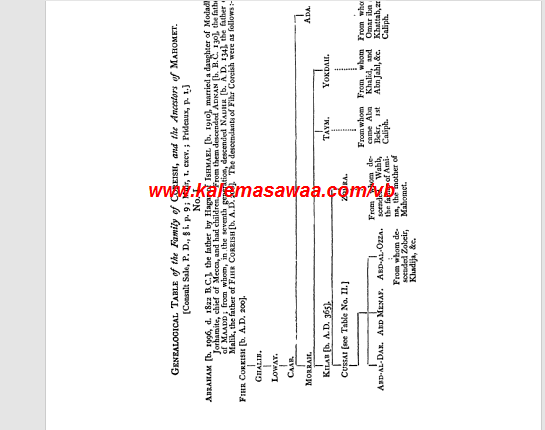
http://archive.org/stream/islamitsfo...ge/26/mode/2up
Hagarism: The Making of the Islamic World
Page: 22
According to the Samaritan Aramaic text known as Asatir, the sons of Nebaioth (Nebaioth was the firstborn of our master Ishmael, peace be upon him) are the ones who built Mecca. The Mecca mentioned in this text is read as Bakkah in the Hebrew Samaritan text, which is a clear reference to the place mentioned in the Quran as Bakkah (Mecca).
The context of the text also links it to the death of Ishmael http://books.google.nl/books?id=Ta08...0bakka&f=false A question for the honorable guest: Do you know of a mountain where all peoples gather to pray despite the differences in ethnicity and race??? I mean, Mexicans, Arabs, Berbers, Europeans, Asians, etc. gather there.
“ According to the oldest Jewish dictionaries, they mean by it the mulberry tree: “in Hebrew תּוּת and in Arabic tut.” But according to these clear and obvious indications of the tree’s description, in that a type of liquid comes out of it, this tree is known in Arabic as “the weepers” and it resembles the balsam tree, which is widespread in the dry valleys of Mecca .” ..!!
The second witness: The commentator / Kirkpatrick in the Cambridge commentary on the Psalms says:
" The balsam tree is said to love dry places, and so it grows abundantly in the dry and barren valley of Mecca , which is clearly the reason for the reference to it."
The Cambridge Bible for Schools and Colleges, The Psalms II, III, p. 507
The third witness: The Arabic Bible Dictionary.. says in detail about its location:
- " It may mean the balsam tree or something similar, for in the land of Arabia, near Mecca, there is a tree of this name . It resembles the balsam tree or balsam, and has a white, stinging sap . It is called the weeping tree, because those trees ripen with gum, or because of the drops of dew that fall on it... As for the valley of weeping mentioned in Psalm 84: 6, it may be a geographical spot. But it is likely that it is just an idea that carries a deep meaning, for those who have a good experience with the Lord, by His grace the tragedies in their lives are transformed into joys. "
The fourth witness: Albert Barnes in his commentary.. says:
" As for The weeping tree is found in abundance near Mecca ...!!!, and it is very similar to the balsam tree, and it is likely that it derived its name from the sap that drips from it like tears when a leaf is cut from it.
A Hebrew and English lexicon of the Old Testament, including the Biblical Chaldee (1824)., p. 84
The sixth witness: "Psalms: An Introduction and Critical Commentaries" ... says:
"What is meant by the Valley of Baka? .. It is a place or valley where the weeping trees are found, as Ibn Ezra says. Thanks to this interpretation, we find in 2 Samuel 5:24, and in Chronicles 14:14-15 that the weeping trees are found in the Valley of Rephaim, northwest of Jerusalem. It may then be said that this tree is similar to the Arabian Baka tree, which is a tree of the balsam family, and grows in the barren desert of the Valley of Mecca , and that it gave its name to the valley in which it grows, and it is not necessary that this valley be the Valley of Rephaim .. since this valley is where the
pilgrims pass. " Pslams with Introduction and Critical Notes" Macmillan and Co, P.76
The Seventh Witness: John Burcharst's Hebrew and English Dictionary.. says:
An Hebrew and English Lexicon without Points, p. 62. John Parkhurst
“ According to Arab writers, the weeping tree is similar to the balsam tree , and it grows abundantly near Mecca . However, no such tree is known in Palestine .” 3/2093.
“ The name Balsam is undoubtedly derived from the Arabic name ‘balsan’, and Forskal tells us that the Meccan balsam tree is called ‘Abusham’, and this tree grows abundantly near Mecca and its sticks are used to clean the teeth - meaning the siwak - and there is no balsam at all today, in the time of Abu al-Fadl, in Palestine …etc.”
"
Fourth proof:
The Biblical Encyclopedia2/189-190:
I found that it was also mentioned in the Book of Samuel II, Chapter 5... and on the well-known archive site... I downloaded some books that explain the book and comment on it... and I photographed for you what I read here.
| This image is in another size. Click here to view the image in its correct form. The image dimensions are 850x1100. |
From this standpoint, we did not stray far from Mecca... even when translating the place... although it is assumed that the names of places are proper names that are not translated during the translation process.
The evidence that “Bakkah” mentioned in the Holy Quran is the same as “Makkah Al-Mukarramah” and is the same as “Bakkah”
What is this "Baka"????
It is the balsam tree, as the Takla website says.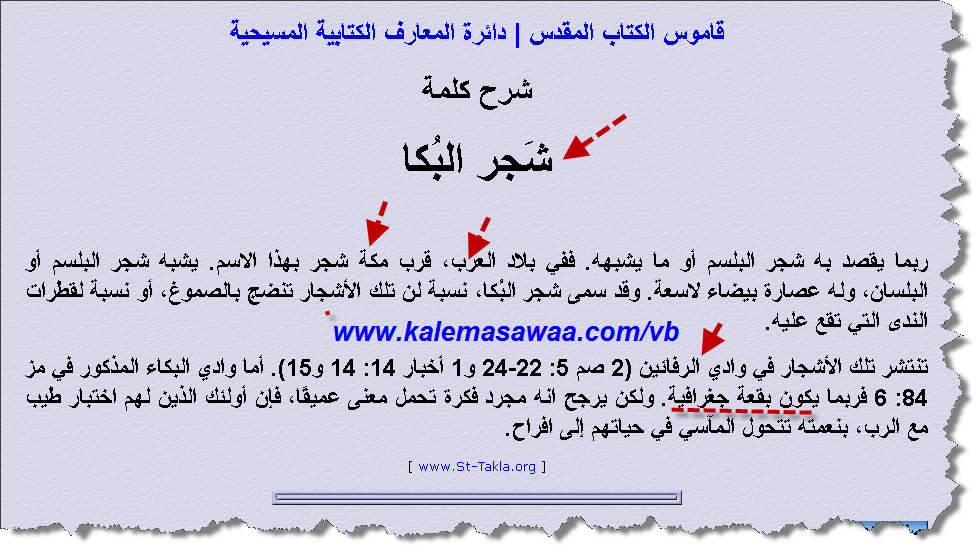
For more information: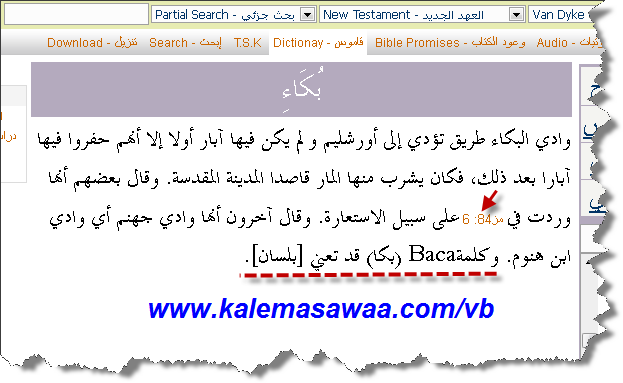
"Baka" is the valley of the balsam tree ( meaning a place ):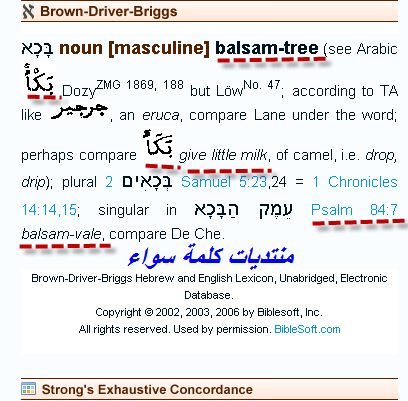
Another proof that "Baka" is a place . Where is the valley located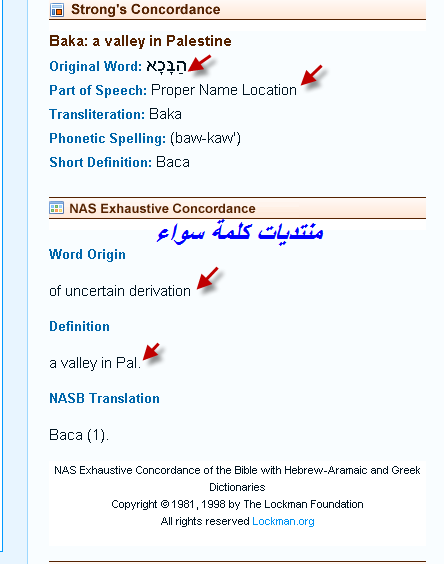
where the balsam or Baka trees are abundant?
The Takla website identified two places where this type of tree is abundant.
1- Wadi Al-Rafa'in
2- Makkah Al-Mukarramah
| The weeping tree may refer to the balsam tree or something similar. In the land of Arabia, near Mecca , there is a tree with this name. It resembles the balsam tree, and has a stinging white sap. The weeping tree was named because these trees ripen with resin, or because of the dew drops that fall on them. These trees are found in the Valley of Rephaim (2 Sam. 5:22-24; 1 Chron. 14:14, 15). The Valley of Weeping mentioned in Ps. 84:6 may be a geographical location. However, it is likely just an idea that carries a deep meaning, for those who have a good experience with the Lord, by His grace, the tragedies in their lives are transformed into joy. |
The specifications of Wadi al-Baqa:
1- A dry, barren place.
2- Pilgrims go to it

Wadi al-Rafa'in, which the Takla website tried to divert attention to in order to cover up the original place, is an exceptionally fertile place
, meaning that it does not meet the specifications of a barren valley where baca/balsam trees are abundant, in addition to it not being a place visited by pilgrims.
Of course, no one knows where Wadi al-Rafa'in is located exactly...!
Always the same phrases: it is thought, we believe, it is likely.....etc.
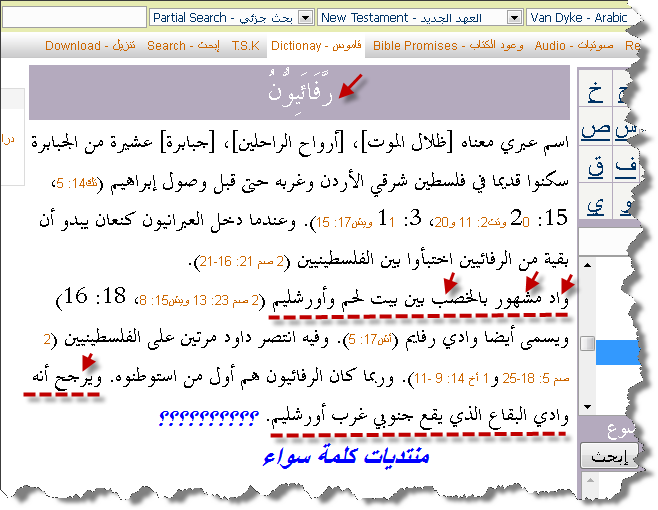
By excluding Wadi al-Rafa'in (Palestine), all that remains is Mecca in the Kingdom of Saudi Arabia,
which is the only place that meets the specifications mentioned in the Bible and in the approved Christian interpretations: A barren (dry) valley + visited by pilgrims + where baca (balsam/balsam) trees are abundant.
The real balsam mentioned by ancient authors is "Balm of Mecca " The balsam tree (the weeping tree) is not a Palestinian plant ,,, What is wrong with you? How do you judge.....?
| This image is in another size. Click here to view the image in its correct form. The image dimensions are 1027x550. |
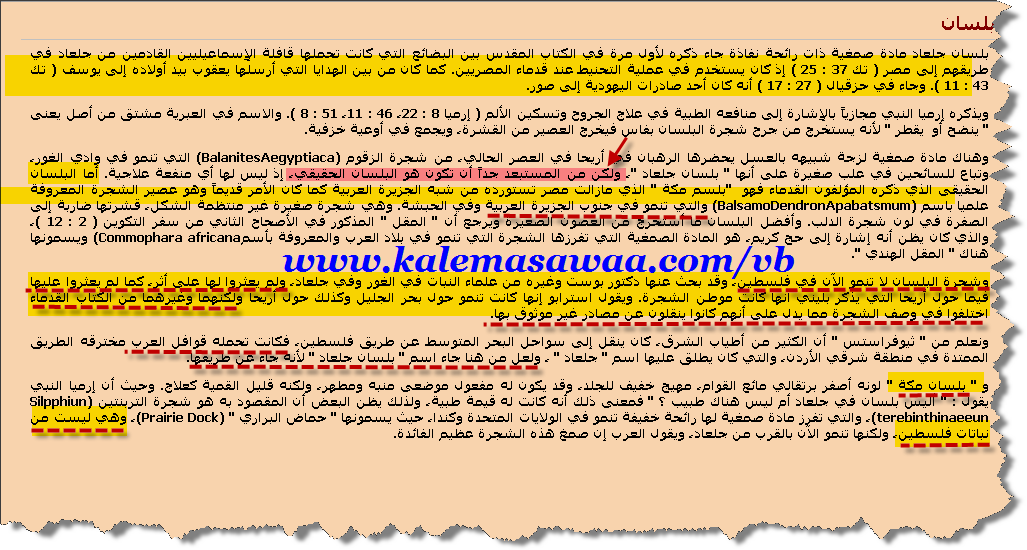
http://katamars.avabishoy.com/bible/...nary/2/289.htm
” location unknown .
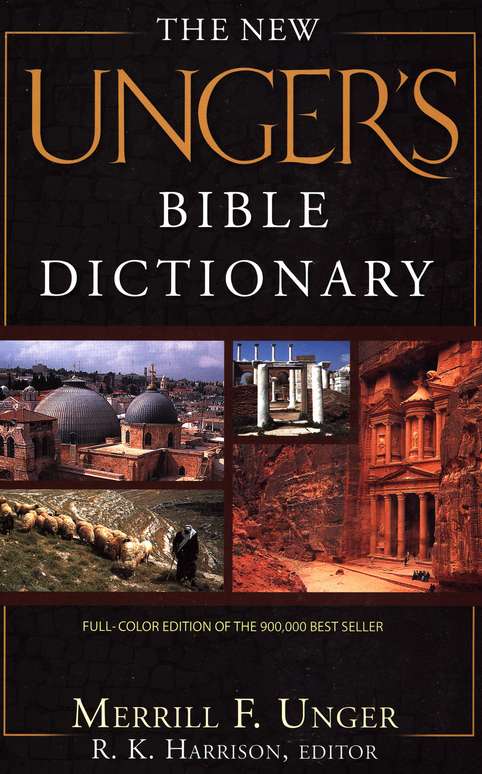
| This image is in another size. Click here to view the image in its correct form. The image dimensions are 633x428. |
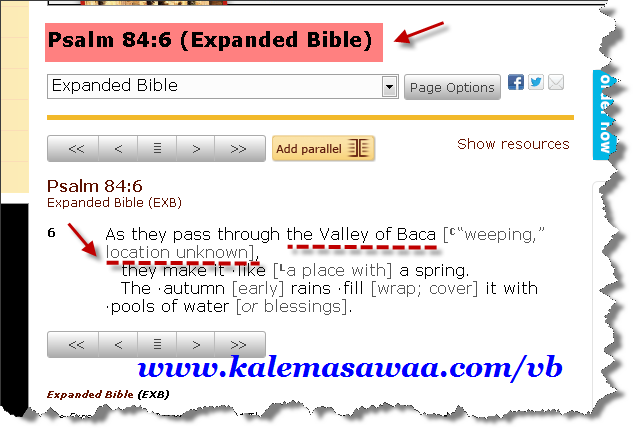
http://www.biblegateway.com/passage/...A6&version=EXB
location unknown
location unknown location unknown location unknown
location unknown
| This image is in another size. Click here to view the image in its correct form. The image dimensions are 689x579. |
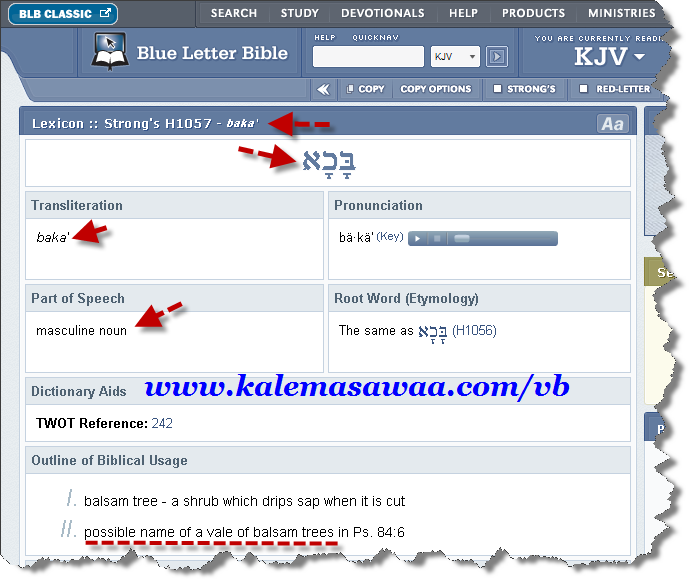
The document above says about "Baka":
"A possible name for a valley where balsam trees abound , (Psalm 84:6)"
------- The fertile
Valley of Rephaim , which we excluded because it does not fit the description of the text of Psalm 84:6 above (joint translation) =======> The barren, dry valley , the remaining barren, dry valley visited by pilgrims + where balsam trees abound - according to the testimony of Christian sites - would be none other than Mecca...
that is, it has no relation, near or far, to the dry , barren Valley of Bakka ...!
For God's sake,
do crops grow in a barren valley???
What's wrong with you? How do you judge???
I will let the Holy Bible answer you.
The Holy Bible cries out: The Valley of Rephaim (Rephaim) is a fertile valley.
Read:
Isaiah 17:5

end quote




Comments
Post a Comment